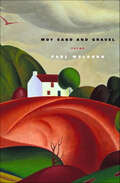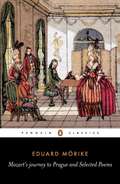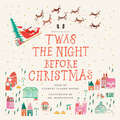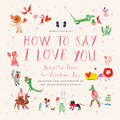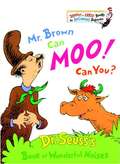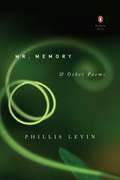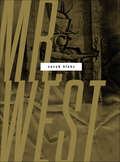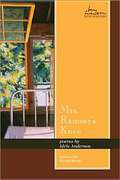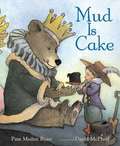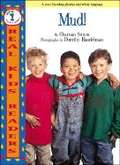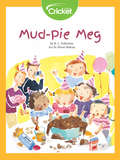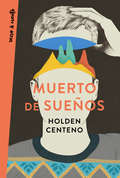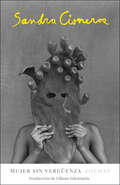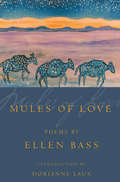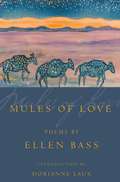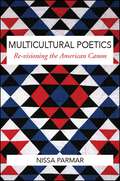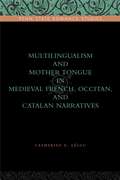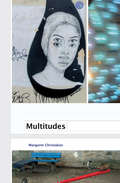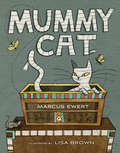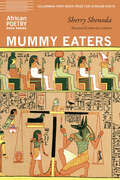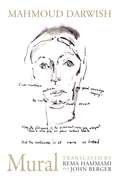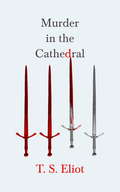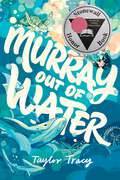- Table View
- List View
Moy Sand and Gravel: Poems
by Paul MuldoonWinner of the Pulitzer Prize, Moy Sand and Gravel by Paul Muldoon, "the most significant English-language poet born since the Second World War" (The Times Literary Supplement).Paul Muldoon's ninth collection of poems, his first since Hay, finds him working a rich vein that extends from the rivery, apple-heavy County Armagh of the 1950s, in which he was brought up, to suburban New Jersey, on the banks of a canal dug by Irish navvies, where he now lives. Grounded, glistening, as gritty as they are graceful, these poems seem capable of taking in almost anything, and anybody, be it a Tuareg glimpsed on the Irish border, Bessie Smith, Marilyn Monroe, Queen Elizabeth I, a hunted hare, William Tell, William Butler Yeats, Sitting Bull, Ted Hughes, an otter, a fox, Mr. and Mrs. Stanley Joscelyne, an unearthed pit pony, a loaf of bread, an outhouse, a killdeer, Oscar Wilde, or a flock of redknots.At the heart of the book is an elegy for a miscarried child, and that elegiac tone predominates, particularly in the elegant remaking of Yeats's "A Prayer for My Daughter" with which the book concludes, where a welter of traffic signs and slogans, along with the spirits of admen, hardware storekeepers, flimflammers, fixers, and other forebears, are borne along by a hurricane-swollen canal, and private grief coincides with some of the gravest matter of our age.
Mozart's Journey to Prague and Selected Poems
by Eduard MörikeThe novella 'Mozart's Journey to Prague' (1855) is an imaginary recreation of the journey Mozart made from Vienna in 1787 to conduct the first performance of Don Giovanni. Set in the rococo world of the Bohemian nobility, it is a charming and playful evocation of Mozart's inner life and creative processes. Morike is one of Germany's greatest lyric poets after Goethe. His poetry combines classicism, romanticism, with elements of the traditional folk or faery tale. This edition contains all the poems for which he is most admired - including the comic idyll, 'The Auld Weathercock'.
Mr. Boddington's Studio: 'Twas the Night Before Christmas
by Clement Clarke MooreMr. Boddington's Studio delivers a stylish and modern illustrated reimagining of the most iconic Christmas picture book story using the words of the Clement Clarke Moore's poem "A Visit from St. Nicholas."A perennial bestseller and timeless gift in the holiday season, multiple adaptations exist of this classic holiday tale, almost exclusively illustrated in bold classic colors. Mr. Boddington's Studio provides a fresh take by using the same poem and updating the style with a sophisticated and modern color palette. Children and parents alike will delight in revisiting this classic holiday tale with the iconic and fresh Mr. Boddington's style.
Mr. Boddington's Studio: Delightful Poems for Valentine's Day
by Mr. Boddington's StudioIt&’s time to celebrate Valentine&’s Day and all things love with this gorgeous and gifty picture book from Mr. Boddington&’s Studio.Following the popularity of Mr. Boddington&’s Studio: 'Twas the Night Before Christmas, Mr. Boddington&’s Studio: Valentine&’s Day features a collection of poems focused on love brought to life by Mr. Boddington&’s signature art style. Including well-known works like "How Do I Love Thee?" by Elizabeth Barrett Browning, lesser-known gems, and original poems written by Mr. Boddington's Studio, this assortment of age-appropriate love poems will be sure to please both parents and young readers looking for a literary way to celebrate the holiday.
Mr. Brown Can Moo! Can You?
by Dr SeussMr. Brown is an expert at imitating all sorts of noises. Dr. Seuss's book of wonderful noises.
Mr. Memory & Other Poems
by Phillis LevinAn intimate, richly textured new collection from Phillis Levin, a poet whose work "shimmers with gracefulness" (David Baker)Phillis Levin's fifth collection of poems encompasses a wide array of styles and voices while staying true to a visionary impulse sparked as much by the smallest detail as the most sublime landscape. From expansive meditation to haiku, in ode and epistle, dream sequence and elegy, Levin's new poems explore motifs deeply social and historical, personal and metaphysical. Their various strategies deploy the sonic powers of lyric, the montage techniques of cinema, and the atavistic energies of the oral tradition. Throughout this volume, the singularity of person, place, and thing--and the plurality of our experience--assert their uncanny presence: an ash on a crackling log, a character from Alfred Hitchcock's The 39 Steps, a burgundy scarf, an x-ray of Bruegel's "Massacre of the Innocents," and a demitasse cup from Dresden are all woven into a collection by turns rhapsodic and ironic, caustic and incantatory. The pre-Socratic mathematician Zeno facing the riddle of an ordinary day; a cloudbank of silence; a pair of second-hand shoes bought for Anne Frank; two crows at play above the peak of a mountain; a dot flickering on the horizon: intimate and philosophical, these poems unveil the metamorphic properties of mind and nature.
Mr. West (Wesleyan Poetry Series)
by Sarah BlakeMr. West covers the main events in superstar Kanye West's life while also following the poet on her year spent researching, writing, and pregnant. The book explores how we are drawn to celebrities—to their portrayal in the media—and how we sometimes find great private meaning in another person's public story, even across lines of gender and race. Blake's aesthetics take her work from prose poems to lineated free verse to tightly wound lyrics to improbably successful sestinas. The poems fully engage pop culture as a strange, complicated presence that is revealing of America itself. This is a daring debut collection and a groundbreaking work. An online reader's companion will be available at http://sarahblake.site.wesleyan.edu.
Mrs. Ramsay's Knee
by Idris AndersonVolume 12 in the Swenson Poetry Award Series, Mrs. Ramsay's Knee offers fresh and elegant poems by Idris anderson, many of them ekphrastic considerations of visual works of art. Among her subjects are paintings by Rembrandt, Rousseau, Pollock, and Chagall, yet she equally explores a set of news photos from the 2006 war between Israel and Hezbollah.
Mud Is Cake
by Pam Muñoz RyanA brother and sister find that when they use their imagination mud can become cake and they themselves can become almost anything.
Mud! (Real Kids Readers, Level #1)
by Charnan SimonThis boy loves mud! And so do his friends. On this good mud day, they have a good time by slipping and slopping in the soft and squishy mud!
Mud-Pie Meg
by B. L. ValentineMeg loved to make mud pies. But mud pies didn't taste very good. For Meg's birthday, instead of mud, Mom made mud pies with graham crackers, peanut butter, and chocolate pudding!
Muerto de sueños
by Holden CentenoMuerto de sueños es el grito de una generación: sus ilusiones, su visión de la vida, el amor, la literatura y la música convertidos en poesía. «Catarsis es entender de alguien algo que nadie entendería.» Este libro habla de encontrar la esperanza y el amor en medio del caos, de los sueños que nos atenazan por las ganas o la imposibilidad de cumplirlos, de una generación que cuando ama lo hace con todas sus fuerzas, que utiliza el arte para comunicarse, que ha convertido la música en su lenguaje, el mundo en su casa, viajar en su raza y lo cotidiano en su escudo. Este libro es vuestro: amad, luchad, no os conforméis. Llevo toda mi vida en Madrid, mi ciudad, pero me gustaría vivir en Nueva Orleans. Una vez volé de un tejado a otro pero nunca nadie me ha creído. De pequeño mi abuelo me daba siempre queso curado y me dejaba cogerle todos los libros que tenía en sus estanterías. Desde entonces mi vida no tiene sentido sin queso y sin literatura. La música me ayuda a vivir. Lo digo en serio. Lloro viendo series y películas. Tengo la fortuna de estar enamorado. Viajamos juntos en una furgoneta California para poder dormir cerca del mar. Ella tiene miedo a la muerte y yo tengo miedo de que se muera. Intento mantener la intensidad a raya. Escribo para hablar del silencio que guardo.
Mujer sin vergüenza / Woman Without Shame
by Sandra CisnerosUna valiente colección de poemas nuevos de Sandra Cisneros, autora del libro de mayor venta La casa en Mango Street. Han pasado veintiocho años desde que Sandra Cisneros publicara un libro de poesía. Con decenas de poemas inéditos, Mujer sin vergüenza es una conmovedora colección de canciones, elegías y declaraciones que dan testimonio de su peregrinaje hacia un renacimiento y hacia el reconocimiento de su derecho como mujer artista. Estas meditaciones descarnadas y a menudo humorísticas sobre la memoria, el deseo y la naturaleza esencial del amor abren un camino hacia la autoconciencia. Para Cisneros, Mujer sin vergüenza es la culminación de la búsqueda de un hogar, en el México de sus antepasados y en su propio corazón.
Muktibodh
by Nandkishore NawalThis books deals with the life, thoughts and creations of Muktibodh. He was a composer as well as a thinker. He has given his thoughts on the poetry and the society. This book explains briefly the works of Muktibodh.
Mules of Love
by Ellen BassBalancing heart-intelligent intimacy and surprising humor, the poems in Ellen Bass's Mules of Love illuminate the essential dynamics of our lives: family, community, sexual love, joy, loss, religion and death. The poems also explore the darker aspects of humanity--personal, cultural, historical and environmental violence--all of which are handled with compassion and grace. Bass's poetic gift is her ability to commiserate with others afflicted by similar hungers and grief. Her poem "Insomnia" concludes: "may something/ comfort you--a mockingbird, a breeze, rain/ on the roof, Chopin's Nocturnes, the thought/ of your child's birth, a kiss,/ or even me--in my chilly kitchen/ with my coat on--thinking of you."Marketing Plans: * National advertising * National media campaign * Advance reader copies * Course adoption mailingAuthor Tour: * Berkeley * Boston * Minneapolis * San Francisco * Santa CruzEllen Bass is co-author (with Laura Davis) of the best-selling The Courage to Heal: A Guide for Women Survivors of Child Sexual Abuse (HarperCollins 1988, 1994), which has sold more than one million copies and has been translated into nine languages. She has also published several volumes of poetry, and her poems have appeared in hundreds of journals and anthologies, including The Atlantic Monthly, Ms., Double Take, and Field. In 1980, Ms. Bass was awarded the Elliston Book Award for Poetry from the University of Cincinnati. Last year, she won Nimrod/Hardman's Pablo Neruda Prize for Poetry, judged by Thomas Lux. She was nominated for a 2001 Pushcart Prize. She lives in Santa Cruz, where she has taught creative writing for 25 years. She has also taught writing workshops at many conferences nationally and in Mallorca, Spain.
Mules of Love (American Poets Continuum)
by Ellen BassBalancing heart-intelligent intimacy and surprising humor, the poems in Ellen Bass’s Mules of Love illuminate the essential dynamics of our lives: family, community, sexual love, joy, loss, religion and death. The poems also explore the darker aspects of humanity—personal, cultural, historical and environmental violence—all of which are handled with compassion and grace. Bass’s poetic gift is her ability to commiserate with others afflicted by similar hungers and grief. Her poem "Insomnia" concludes: "may something/ comfort you—a mockingbird, a breeze, rain/ on the roof, Chopin’s Nocturnes, the thought/ of your child’s birth, a kiss,/ or even me—in my chilly kitchen/ with my coat on—thinking of you."Marketing Plans: • National advertising • National media campaign • Advance reader copies • Course adoption mailingAuthor Tour: • Berkeley • Boston • Minneapolis • San Francisco • Santa CruzEllen Bass is co-author (with Laura Davis) of the best-selling The Courage to Heal: A Guide for Women Survivors of Child Sexual Abuse (HarperCollins 1988, 1994), which has sold more than one million copies and has been translated into nine languages. She has also published several volumes of poetry, and her poems have appeared in hundreds of journals and anthologies, including The Atlantic Monthly, Ms., Double Take, and Field. In 1980, Ms. Bass was awarded the Elliston Book Award for Poetry from the University of Cincinnati. Last year, she won Nimrod/Hardman’s Pablo Neruda Prize for Poetry, judged by Thomas Lux. She was nominated for a 2001 Pushcart Prize. She lives in Santa Cruz, where she has taught creative writing for 25 years. She has also taught writing workshops at many conferences nationally and in Mallorca, Spain.
Mules of Love: Poems
by Ellen BassBalancing heart-intelligent intimacy and surprising humor, the poems in Ellen Bass's Mules of Love illuminate the essential dynamics of our lives: family, community, sexual love, joy, loss, religion and death. The poems also explore the darker aspects of humanity-personal, cultural, historical and environmental violence-all of which are handled with compassion and grace. Bass's poetic gift is her ability to commiserate with others afflicted by similar hungers and grief. Her poem "Insomnia" concludes: "may something/ comfort you-a mockingbird, a breeze, rain/ on the roof, Chopin's Nocturnes, the thought/ of your child's birth, a kiss,/ or even me-in my chilly kitchen/ with my coat on-thinking of you. "
Multicultural Poetics: Re-visioning the American Canon (SUNY series in Multiethnic Literatures)
by Nissa ParmarMulticultural Poetics provides a new perspective on American poetry that will contribute to the evolution of contemporary critical practice. Nissa Parmar combines formalist analysis with cultural studies theory to trace a lineage of hybrid poetry from the American Renaissance to what Marilyn Chin deemed America's "multicultural renaissance," the blossoming of multicultural literature in the 1980s and 1990s. This re-visionary literary history begins by analyzing Whitman and Dickinson as postcolonial poets. This critical approach provides an alternative to the factionalism that has characterized twentieth-century American poetic history and continues to inform literary criticism in the twenty-first century. Parmar uses a multiethnic, multigender method that emphasizes the relationship between American poetic form and cultural development. This book provides a new approach by using hybridity as the critical paradigm for a study that groups multiethnic and emergent authors. It thereby combats literary ghettoization while revealing commonalities across American literatures and the cross-fertilization that has informed their development.
Multilingualism and Mother Tongue in Medieval French, Occitan, and Catalan Narratives (Penn State Romance Studies #11)
by Catherine E. LégluThe Occitan literary tradition of the later Middle Ages is a marginal and hybrid phenomenon, caught between the preeminence of French courtly romance and the emergence of Catalan literary prose. In this book, Catherine Léglu brings together, for the first time in English, prose and verse texts that are composed in Occitan, French, and Catalan-sometimes in a mixture of two of these languages. This book challenges the centrality of "canonical" texts and draws attention to the marginal, the complex, and the hybrid. It explores the varied ways in which literary works in the vernacular composed between the twelfth and fifteenth centuries narrate multilingualism and its apparent opponent, the mother tongue. Léglu argues that the mother tongue remains a fantasy, condemned to alienation from linguistic practices that were, by definition, multilingual. As most of the texts studied in this book are works of courtly literature, these linguistic encounters are often narrated indirectly, through literary motifs of love, rape, incest, disguise, and travel.
Multitudes
by Margaret ChristakosRevelling in the value of social polyphony from Walt Whitman's "Song of Myself," Multitudes looks at its contemporary theatres of Facebook and Twitter, post-riot police surveillance, protest culture and poetry itself. With wit, perceptiveness and her trademark linguistic sonar, Margaret Christakos keenly examines intimacies and banishments, as well as intergenerational grief, self-display and social hope.
Mummy Cat
by Lisa Brown Marcus EwertDeep within this maze of stone, a creature wakes up, all alone . . . Mummy Cat prowls his pyramid home, longing for his beloved owner. As he roams the tomb, lavish murals above his head display scenes of the cat with his young Egyptian queen, creating a story-within-a-story about the events of centuries past. Hidden hieroglyphs deepen the tale and are explained in an informative author's note. Marcus Ewert and Lisa Brown's smart, beautiful book is a marvel of sophisticated simplicity, infinitely engaging to examine in detail, and complete with a sweetly surprising plot twist sure to delight young cat-lovers and budding Egyptologists alike.
Mummy Eaters (African Poetry Book)
by Sherry ShenodaWinner of the Sillerman First Book Prize for African Poets, Sherry Shenoda&’s collection Mummy Eaters follows in the footsteps of an imagined ancestor, one of the daughters of the house of Akhenaten in the Eighteenth Dynasty, Egypt. Shenoda forges an imagined path through her ancestor&’s mummification and journey to the afterlife. Parallel to this exploration run the implications of colonialism on her passage. The mythology of the ancient Egyptians was oriented toward resurrection through the preservation of the human body in mummification. Shenoda juxtaposes this reverence for the human body as sacred matter and a pathway to eternal life with the sixteenth- and seventeenth-century European fascination with ingesting Egyptian human remains as medicine and using exhumed Egyptian mummies as paper, paint, and fertilizer. Today Egyptian human remains are displayed in museums. Much of Mummy Eaters is written as a call and response, in the Coptic tradition, between the imagined ancestor and the author as descendant.
Mural
by Mahmoud DarwishMahmoud Darwish was the Palestinian national poet. One of the greatest poets of the last half-century, his work evokes the loss of his homeland and is suffused with the pain of dispossession, exile and loss. His poems also display a brilliant acuity, a passion for and openness to the world and, above all, a deep and abiding humanity. Here, his close friends John Berger and Rema Hammami present a beautiful new translation of two of Darwish’s later works, his long masterpiece "Mural," a contemplation of his life and work written following life-threatening surgery, and his last poem, "The Dice Player," which Darwish read in Ramallah a month before his death. Illustrated with original drawings by John Berger, Mural is a testimony to one of the most important and powerful poets of our age.
Murder in the Cathedral
by T. S. EliotA vivid exploration of the fundamental contradiction of martyrdom. Though best known for his poetry, T.S. Eliot was also an accomplished playwright. Murder in the Cathedral is a beautiful, haunting poetic take on the martyrdom of Archbishop Thomas Becket in 1170. Becket sees his death coming, but embraces it. This strange duality - a martyr's death as both tragic and glorious - serves as the basis for the action. Penguin Random House Canada is proud to bring you classic works of literature in e-book form, with the highest quality production values. Find more today and rediscover books you never knew you loved.
Murray Out of Water
by Taylor Tracy* A Stonewall Award Honor Book * ALA Notable Book *Perfect for fans of Rebecca Stead, Natalie Lloyd, and Jasmine Warga, this beautiful novel in verse explores one girl's struggle to regain her magic after a hurricane forces her to move away from her beloved ocean that, she believes, has given her special powers. Bighearted and observant twelve-year-old Murray O’Shea loves the ocean. Every chance she gets, she’s in it. It could be because the ocean never makes her apologize for being exactly who she is—something her family refuses to do—but it could also be because of the secret magic that Murray shares with the ocean. Though she can’t explain its presence, the electric buzz she feels from her fingertips down to her toes allows her to become one with the ocean and all its creatures, and it makes Murray feel seen in a way she never feels on land.But then a hurricane hits Murray’s Jersey Shore home, sending the O'Sheas far inland to live with relatives. Being this far from the ocean, Murray seems to lose her magic. And stuck in a house with her family, she can no longer avoid the truths she’s discovering about herself—like how she feels in the clothes her mom makes her wear, or why she doesn't have boys on the brain like other girls her age.But it’s not all hurricanes and heartache. Thankfully, Murray befriends a boy named Dylan, who has a magic of his own. When Murray agrees to partner with him for a youth roller-rama competition in exchange for help getting her magic back, the two forge an unstoppable bond—one that shows Murray how it's not always the family you were given that makes you feel whole...sometimes it's the family you build along the way.
